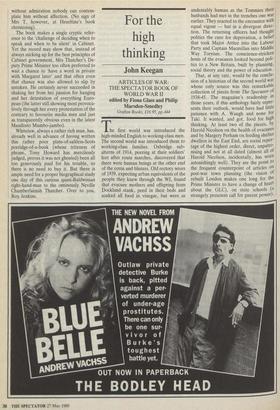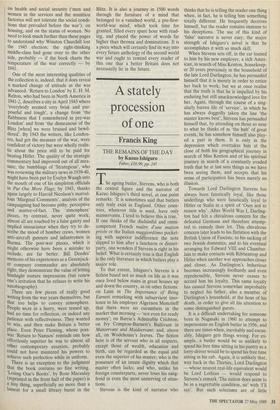For the high thinking
John Keegan ARTICLES OF WAR: THE SPECTATOR BOOK OF WORLD WAR II edited by Fiona Glass and Philip Marsden-Smedley
Grafton Books, f16.95, pp.444
The first world war introduced the high-minded English to working-class men. The second world war introduced them to working-class families. Oxbridge sub- alterns of 1914, peering at their soldiers' feet after route marches, discovered that there were human beings at the other end of the corns and blisters. Old rectory wives of 1939, expecting urban equivalents of the people they knew through the WI, found that evacuee mothers and offspring from Dockland stank, peed in their beds and soaked all food in vinegar, but were as
undeniably human as the Tommies their husbands had met in the trenches one war earlier. They reacted to the encounter with equal vigour — but in a divergent direc- tion. The returning officers had thought politics the cure for deprivation, a belief that took Major Attlee into the Labour Party and Captain Macmillan into Middle Way Toryism. The conscience-stricken hosts of the evacuees looked beyond poli- tics to a New Britain, built by planning, social theory and the power of education.
That, at any rate, would be the conclu- sion of a historian of the second world war whose only source was this remarkable collection of pieces from The Spectator Of 1938-45. The magazine's readership in those years, if this anthology fairly repre- sents their outlook, would have had little patience with A. Waugh and none for Taki. It wanted, and got, food for high thinking. At least two of the pieces, by Harold Nicolson on the health of evacuees and by Margery Perham on feeding shelter dwellers in the East End, are social repor- tage of the highest order, direct, unpatro- nising and not at all dated (almost all of Harold Nicolson, incidentally, has worn astonishingly well). They are the point to the frequent counterpoint of articles on post-war town planning (the vision of rebuilt London makes one long for the Prime Minister to have a change of heart about the GLC), on state schools (a strangely prescient call for parent power), on health and social security (`men and women in the services and the munition factories will not tolerate the social condi- tions that prevailed before the war'), on housing, and on the status of women. No need to look much further than these pages to understand why Winston Churchill lost the 1945 election; the right-thinking middle-class had gone over to the other side, probably — if the book charts the temperature of the war correctly — by 1941.
One of the most interesting qualities of the collection is, indeed, that it does reveal a marked change of attitude as the war advanced. 'Return to London' by E. H. M. Relton, who had been in North America in 1941-2, describes a city in April 1943 where `everybody seemed very brisk and pur- poseful and tough', a change from 'the flabbiness that I remembered in pre-war London' and from 'the demeanour of the Blitz [when] we were bruised and bewil- dered'. By 1943 the writers, like London- ers, had got the measure of the war, were confident of victory but were wholly realis- tic about the price still to be paid for beating Hitler. The quality of the strategic commentary had improved out of all mea- sure; the bumblings of `Strategicus', who was reviewing the military news in 1939-40, might have been put by Evelyn Waugh into the mouth of one of his simpleton officials in Put Out More Flags; by 1943, thanks again largely to Harold Nicolson's marvel- lous 'Marginal Comments', analysis of the campaigning had become pithy, perceptive and matter-of-fact. The 'atmosphere' pieces, by contrast, never quite work; almost all are touched by a false gaiety and Implied insouciance when they try to de- scribe the mood of bomber crews, women anti-aircraft gunners and infantrymen in Burma. The post-war pieces, which it might otherwise have been a mistake to include, are far better. Bill Deedes' memoirs of his experiences as a Greenjack- et company commander are absolutely right; they demonstrate the value of letting hindsight mature impressions (but renew one's irritation that he refuses to write his autobiography). There are few pieces of really good writing from the war years themselves, but that too helps to convey atmosphere. People were in a hurry, were tensed up, had no time for reflection, or indeed any patience with reflectiveness. They wanted to win, and then make Britain a better place. Even Peter Fleming, whose post- War 'Return to Namsos' reminds one how effortlessly superior he was to almost all other contemporary essayists, probably could not have mustered his powers to achieve such perfection while in uniform. There is an exception to the judgment that the book contains no fine writing. `Losing One's Books', by Rose Macaulay (reprinted in the front half of the paper) is a tiny thing, superficially no more than a lament for a small library burnt in the Blitz. It is also a journey in 1500 words through the furniture of a mind that belonged to a vanished world, a pre-first- world-war mind, which took time for granted, filled every spare hour with read- ing, and placed the power of words far higher than thrones and dominations. It is a piece which will certainly find its way into every future anthology of the second world war and ought to remind every reader of this one that a better Britain does not necessarily lie in the future.



















































 Previous page
Previous page